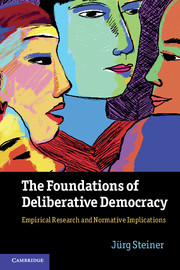Book contents
- Frontmatter
- Contents
- Figures
- Acknowledgments
- Introduction
- 1 Citizen participation in deliberation
- 2 Rationality and stories in deliberative justification
- 3 Common good and self-interest in deliberative justification
- 4 Respect in deliberation
- 5 Public openness of deliberation
- 6 Force of better argument in deliberation
- 7 Truthfulness in deliberation
- 8 Deliberation in the media and the Internet
- 9 Favorable conditions for deliberation
- 10 Favorable consequences of deliberation
- 11 The praxis of deliberation
- Appendix Newest version of Discourse Quality Index (DQI)
- Index
- References
5 - Public openness of deliberation
Published online by Cambridge University Press: 05 August 2012
- Frontmatter
- Contents
- Figures
- Acknowledgments
- Introduction
- 1 Citizen participation in deliberation
- 2 Rationality and stories in deliberative justification
- 3 Common good and self-interest in deliberative justification
- 4 Respect in deliberation
- 5 Public openness of deliberation
- 6 Force of better argument in deliberation
- 7 Truthfulness in deliberation
- 8 Deliberation in the media and the Internet
- 9 Favorable conditions for deliberation
- 10 Favorable consequences of deliberation
- 11 The praxis of deliberation
- Appendix Newest version of Discourse Quality Index (DQI)
- Index
- References
Summary
Normative controversies in the literature
Jürgen Habermas has insisted throughout his career that good deliberation should be public and transparent. He still very much emphasizes this point in a recent publication where he demands “publicity and transparency for the deliberative process.” He justifies the logic of publicity in claiming that this is a necessary condition to “generate legitimacy.” This Habermasian view was for a long time shared by virtually all deliberative theorists, and many of them still stress the importance of publicity and transparency as a key element of the deliberative model. Claudia Landwehr, for example, argues:
The strongest incentive for actors to name generalizable reasons and engage in argumentation of them exists where interaction is public … publicity forces actors to give the best possible justification for their premises and decisions … Accessibility could be guaranteed if doors remain ajar, for example if a committee meeting that is not organized for a large audience is nonetheless open to interested members of the public, journalists or researchers.
Although Landwehr adheres to the logic of publicity, she acknowledges that in practice publicity may be relative. Her point is that even if doors are not fully open but only ajar, the logic of publicity should still apply in the sense that reasons should be “generalizable and transferable.”
- Type
- Chapter
- Information
- The Foundations of Deliberative DemocracyEmpirical Research and Normative Implications, pp. 125 - 138Publisher: Cambridge University PressPrint publication year: 2012



